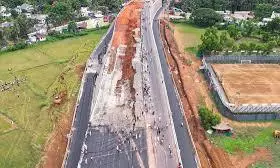
National highways need audits; not escapism and hiding
text_fieldsIt has been two weeks since serious landslides and collapses were reported in various parts of the national highway under construction in Kerala. The first collapse was seen in the Kooriyad section of Malappuram. Collapses were found on successive days in Kuppam in Kannur, Thiruvangoor in Kozhikode, Chavakkad in Thrissur, and Chattanchal in Kasaragod. The road and the overpass are crumbling like the icing on top of a cake. In addition, the protective wall and service road are giving way in many places. A part of the retaining wall in Kooriyad, Malappuram, which was the first to fall, collapsed the other day. The concrete has come off in such a way that the rods of the overpass are visible at Kavungal in Kasaragod. With the heavy rains, the service roads are filled with water and are now like mini pools, increasing the risk of vehicles skidding. People literally risk their lives to travel on these roads during heavy rains. The three-member committee headed by IIT professor K.R. Rao, appointed by the Centre to examine the collapse of the national highway in the Kooriyad section, found that the construction workers had made serious mistakes, that soil testing was not carried out effectively, and that there was a flaw in the design. The Central and Kerala governments, which had been taking pride in the progress of the national highway construction until the day before the collapse was reported, are now breaking their silence on the issue only to blame each other. The governments are running around saying that it was all the fault of the construction company. How can the public not ask what they were doing until the road collapsed?
Also read: Centre debars KNR constructions over National Highway collapse
Right at the time of construction, locals had indicated that it was dangerous to build a six-lane road by filling up the fields that used to get flooded during the monsoon and that it was preferable to build the road using aqueducts. The road that was filled up and raised in this way, the Kooriyad Road, collapsed. The reason for all this unforgivable negligence as well as the unscientific nature of the construction of the road which was built without considering the soil, climate and changes in the climate, and completely ignoring the suggestions and concerns of residents, environmentalists, and local experts. The possibility of massive corruption cannot be ruled out either. The governments, on the other hand, did not pay even half the attention they paid to boasting to ensure the efficiency of the construction work. Instead, they are in a hurry to run away with excuses. Water is often seen flooding the houses and fields along the national highway. Having given adequate compensation for land acquisition is not a licence or justification for construction that is harmful to the people.
Also read: Gadkari assures probe into NH 66 collapse in Malappuram: MP ET Basheer
Roads that facilitate smooth movement without any hitches are essential for the peaceful and secure life of any country. Moreover, they are also essential for the progress of the country's economy. A high-speed corridor extending from Parassala to Manjeswaram, consisting of a national highway, a hill highway, a coastal highway, and a greenfield highway, is being prepared in Kerala. In addition, the Wayanad tunnel has also been approved. But if such careless and unnatural construction methods are to be adopted in these places too, one cannot rule out the risk of a major disaster.
Also read: Travelling on national highways to get costlier with 4–5% toll hike
The argument forf prioritising the minimisation of environmental impact while carrying out developmental projects is often branded as reactionary and anti-development. But, the vast highways in the making that are already falling apart and lying in ruins is a clap back to that idea. What the country needs is responsible development efforts. It will not be possible as long as lapses are not audited and released to the public which will identify the parties responsible and hold them accountable. Therefore, the national highway development activities should be subjected to strict auditing immediately. The defects in the construction, financial transactions, and environmental impacts should all be thoroughly examined. If the construction companies have committed lapses, heavy fines should be imposed and reconstruction should be carried out safely. This demand is being put forward not to stall development, but to ensure that the projects implemented in the name of development bring real benefits. It is such crucial and detailed checks, carried out from time to time by governments, voluntary organisations, and public groups that lead forward any transparent democratic system in a healthy manner.
Also read: Centre approves ₹9,599 cr for National Highway maintenance in FY25






